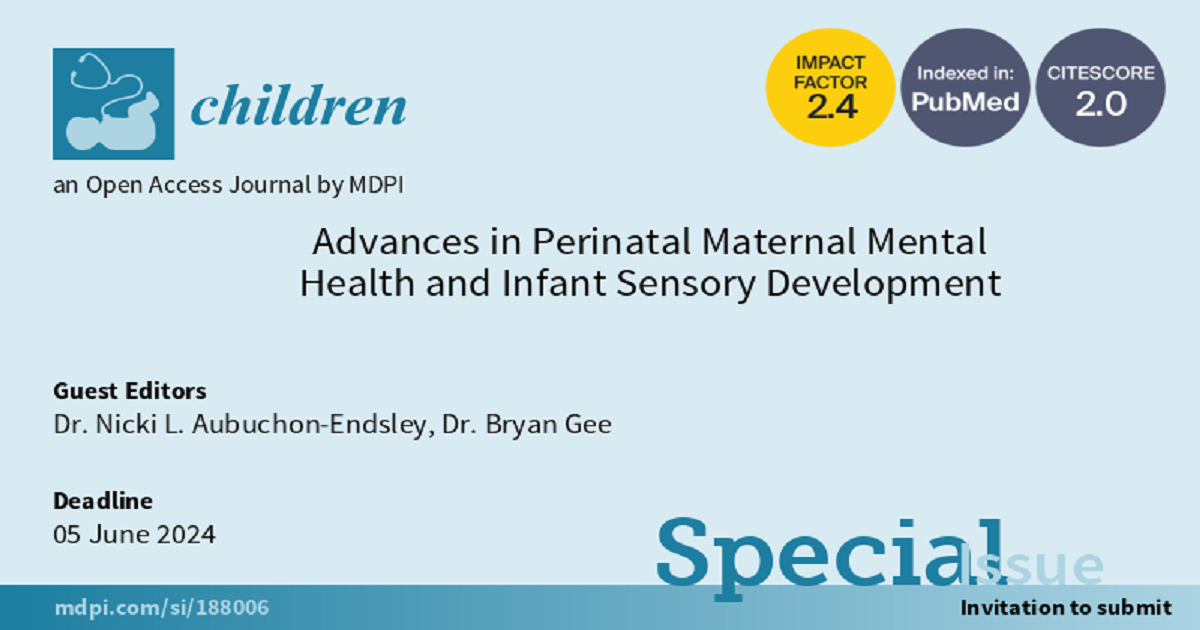Advances in Perinatal Maternal Mental Health and Infant Sensory Development
A special issue of Children (ISSN 2227-9067). This special issue belongs to the section "Pediatric Neonatology".
Deadline for manuscript submissions: closed (6 December 2024) | Viewed by 4829

Special Issue Editors
Interests: women’s health; developmental psychobiology; perinatal psychology; health equity
Special Issue Information
Dear Colleagues,
Maternal perinatal mental health plays a robust causal role in shaping infant development, which predicts a host of short-term and long-term outcomes regarding health and functioning. Among the various types of development, sensory development has received relatively less empirical investigation. However, contemporary research suggests that sensory processing is associated with important maternal (e.g., prenatal and postnatal anxiety and depression symptom severity), infant (e.g., sleep quality and other forms of development), and maternal–infant (e.g., duration and frequency of breastfeeding) variables. Additionally, sensory symptoms (i.e., reactivity to sensory input and unusual interest in sensory aspects of the environment) constitute one criterion for autism spectrum disorder, suggesting that they may be an important research target in understanding neurodevelopmental disorders. Therefore, on behalf of the Children Editorial Office, we are pleased to invite you to submit research papers and review articles to disseminate vital information about this topic.
Research areas may include (but are not limited to) the following: prenatal, postnatal, or perinatal mental health, sensory development in infancy, sensory processing in infancy, and early neurodiversity.
We look forward to reviewing your contributions.
Dr. Nicki L. Aubuchon-Endsley
Guest Editor
Dr. Bryan Gee
Guest Editor Assistant
Manuscript Submission Information
Manuscripts should be submitted online at www.mdpi.com by registering and logging in to this website. Once you are registered, click here to go to the submission form. Manuscripts can be submitted until the deadline. All submissions that pass pre-check are peer-reviewed. Accepted papers will be published continuously in the journal (as soon as accepted) and will be listed together on the special issue website. Research articles, review articles as well as short communications are invited. For planned papers, a title and short abstract (about 100 words) can be sent to the Editorial Office for announcement on this website.
Submitted manuscripts should not have been published previously, nor be under consideration for publication elsewhere (except conference proceedings papers). All manuscripts are thoroughly refereed through a single-blind peer-review process. A guide for authors and other relevant information for submission of manuscripts is available on the Instructions for Authors page. Children is an international peer-reviewed open access monthly journal published by MDPI.
Please visit the Instructions for Authors page before submitting a manuscript. The Article Processing Charge (APC) for publication in this open access journal is 2400 CHF (Swiss Francs). Submitted papers should be well formatted and use good English. Authors may use MDPI's English editing service prior to publication or during author revisions.
Keywords
- prenatal
- postnatal
- perinatal maternal mental health
- sensory development in infancy
- sensory processing in infancy
- early neurodiversity
Benefits of Publishing in a Special Issue
- Ease of navigation: Grouping papers by topic helps scholars navigate broad scope journals more efficiently.
- Greater discoverability: Special Issues support the reach and impact of scientific research. Articles in Special Issues are more discoverable and cited more frequently.
- Expansion of research network: Special Issues facilitate connections among authors, fostering scientific collaborations.
- External promotion: Articles in Special Issues are often promoted through the journal's social media, increasing their visibility.
- e-Book format: Special Issues with more than 10 articles can be published as dedicated e-books, ensuring wide and rapid dissemination.
Further information on MDPI's Special Issue policies can be found here.







